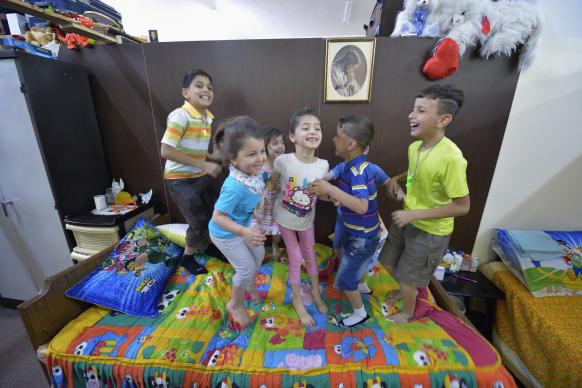“The war in Syria has shaken the foundations of the Christians in Syria and caused many to flee, while others refused to leave their homes and have remained stalwart only to suffer from abductions and violence.”
Many faith-based and nongovernmental organizations are aiding Syrian and Iraqi refugees of all religions. The United Methodist Committee on Relief has committed more than $2 million in response to the crisis in Syria and Iraq since late 2013.
The Rev. Jack Amick, UMCOR’s top executive for international disaster response, compared the conflict in Syria, Iraq and neighboring countries to “a slow burning fire that flares up from time to time and periodically catches the attention of the popular press” even as the pain and suffering “persists on a daily basis.”
Signs of trouble
Among the flare ups this month:
- Reuters reported Aug. 11 that the Islamic State, also known as ISIS or ISIL, has released 22 of the Assyrian Christians it abducted from villages in northeastern Syria earlier this year but more than 150 remained as captives.
- Syrian church sources and activists said contact with hundreds of people, many of them Christians, was lost after the Islamic State attacked the isolated oasis town of Qariyatain in Homs Province in early August.
- Two church leaders kidnapped in Syria’s northern Aleppo province on April 22, 2013 — Archbishop Gregorius Yohanna Ibrahim of the Syriac Orthodox Church and Bishop Boulos Yazigi of the Greek Orthodox Church — still are missing without a trace.
- Tens of thousands of Iraqi Christians marked a year in exile in Jordan, the Associated Press reported, after fleeing communities overtaken by the Islamic State.
“The world has forgotten us,” Vian Dakhil, a Yazidi member of the Iraqi Parliament, told the London Telegraph on the one-year anniversary of the killings and kidnappings of thousands of Yazidi Christians around their historic homeland of Mount Sinjar.
Religious diversity and freedom in Syria has fallen victim to the civil war there, the U.S. Commission on International Religious Freedom noted earlier this year in a March 15 press release marking the fourth anniversary of protests that led to Syrian conflict.
“By the systematic targeting and massacre of primarily Sunni Muslims, the al-Assad regime created the environment in which ISIL could rise and spread, threatening the entire region and all religious communities that reject its violent religious ideology, with the smallest religious minority communities facing an existential threat,” the commission said.
The World Council of Churches has repeatedly expressed concerns about the threat against minority communities in Syria and Iraq. The council sent a delegation to the Kurdistan region of Iraq last summer, meeting with church leaders and displaced people from Christian, Yazidi and Kaka’i (Sufi Muslim) communities.
Afterward, the WCC presented a statement at the U.N. Human Rights Council Special Session on the Human Rights Situation in Iraq on Sept. 1, 2014, at the U.N. offices in Geneva, Switzerland
Relief work
As it has since its founding 75 years ago, UMCOR provides humanitarian assistance to all, Amick noted.
“The stories we hear about Christian communities being persecuted breaks our hearts,” he told United Methodist News Service. “But, as Jesus’ story of the Good Samaritan reminds us, all human suffering should break our hearts such that we take action regardless of human divisions and labels of race, creed, religion.”
Working with various aid partners, UMCOR has helped supply basic needs to displaced Syrian and Iraqi families over the past two years. Francesco Paganini, the agency’s manager for international disaster response, said the agency currently has two open grants: the provision of food aid for 850 families in Syria and the provision of 985 hygiene kits and 99 newborn health kits to internally displaced persons in northern Iraq.
Donor fatigue is always an issue with long-running humanitarian crises, but both UMCOR officials stressed that forgetting these refugees is not an option.
When Paganini visited the UMCOR-supported child-friendly space for Syrian refugees in Turkey, he thought of his own grandfather, who was once a refugee. Both his grandfather and the children he met in the tent that day served as a reminder “that we still live in a broken world” and need to take action, he wrote in a commentary in Interpreter Magazine.
For some children caught up in the Syria-Iraq crisis, violence has become part of the narrative of their lives, Amick pointed out. “Somehow the cycle of violence must be broken,” he said. “Pray for the healing of the children, for they are our only hope for peace in the future.”
He urged church members not to forget about Syria and Iraq and to pray weekly for peace and an end to violent conflict around the world.
Last Updated on January 30, 2024

